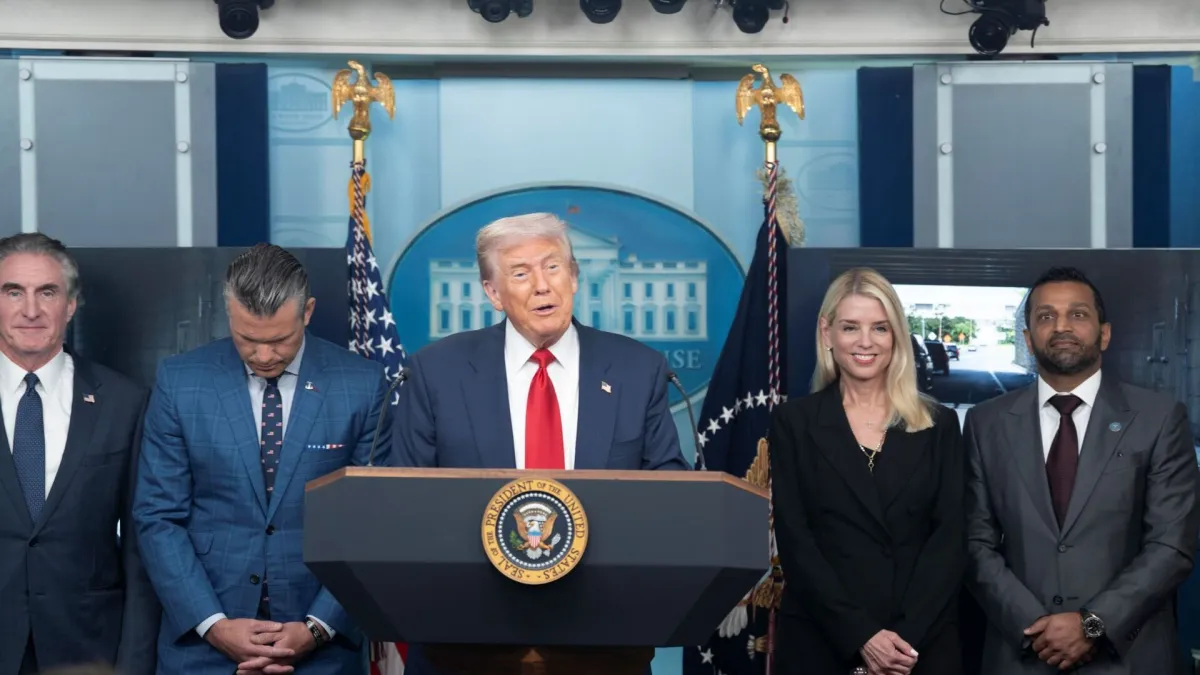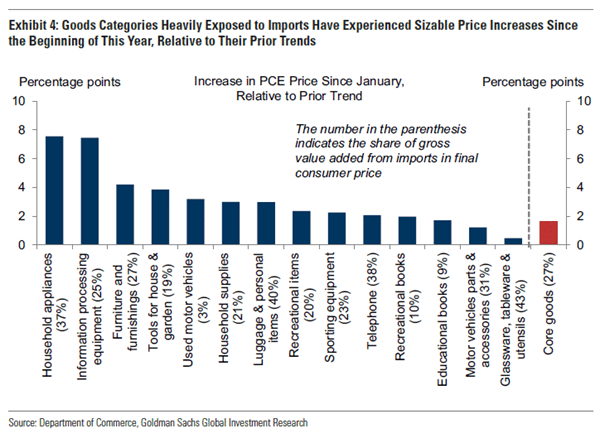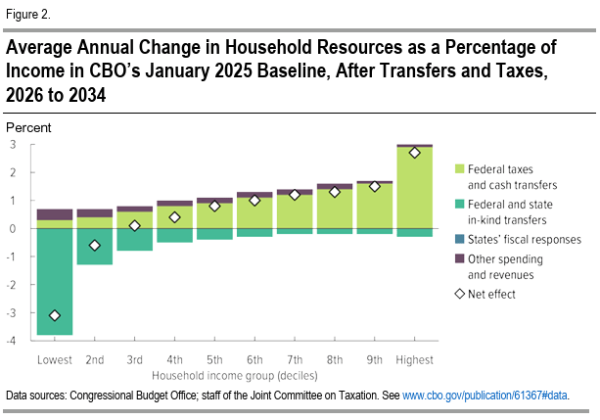
Happy Monday! President Trump will hold a high-stakes summit with Russian President Vladimir Putin on Friday, but he kicked off the week with a news conference this morning to announce an extraordinary exercise of presidential power to crack down on crime and carnage purportedly plaguing Washington, D.C. Trump also extended a tariff truce with China until November 9, allowing more time for negotiations on a trade deal.
Here's what you should know.
Trump Orders Federal Takeover of DC Police, Deployment of National Guard
President Trump on Monday declared a crime emergency in the District of Columbia and said he was putting the D.C. police under federal control and will deploy National Guard troops to "rescue our nation's capital from crime, bloodshed, bedlam and squalor and worse."
Trump criticized major American cities as being plagued by violence and said the nation's capital was being overrun by "violent gangs and bloodthirsty criminals," despite pushback from local officials and statistics that show declining rates of violent crime.
"The Administration's actions are unprecedented, unnecessary, and unlawful," D.C. Attorney General Brian Schwalb, a Democrat, said in a statement. "There is no crime emergency in the District of Columbia. Violent crime in DC reached historic 30-year lows last year, and is down another 26% so far this year. We are considering all of our options and will do what is necessary to protect the rights and safety of District residents."
Why it matters: "The National Guard deployment will be another example of the president's increasing use of U.S. military forces to carry out his objectives on American soil, an approach that has been used only sparingly over history and which has spurred concerns of over-militarization," The Washington Post's Michael Birnbaum and Perry Stein write.
Trump's Tariffs Are About to Clobber US Consumers
President Trump on Monday gave U.S. and Chinese negotiators another 90 days to reach an agreement on trade, delaying a set of sky-high tariffs that threaten to upend commerce between the world's two largest economies. But even with the delay, U.S. consumers are starting to feel the pinch of Trump's aggressive trade war - and the pinch is about to get a lot more painful.
A bit of breathing room: As part of his ongoing effort to rewire global trade to favor the U.S., Trump in April imposed tariffs as high as 145% on Chinese imports, with China responding by raising its own tariffs and cracking down on the export of rare earth materials to the U.S. The two sides agreed to a 90-day truce in May that was scheduled to expire tomorrow but is now extended into November.
Although the crippling tariffs Trump has threatened are now on hold, Chinese exporters are still facing higher tariffs than they did before Trump took office. Most imports from China face a 10% base tariff, plus a 20% punitive tariff due to China's alleged role in the fentanyl crisis.
Consumers will pay: The tariffs on China, along with a host of other import duties on trading partners around the world, are pushing prices higher in the U.S. economy. According to a new analysis by Goldman Sachs, those price hikes have been muted so far - but they're about to get much worse, with U.S. consumers bearing the brunt of the economic pain.
In a research note released this past weekend, Goldman analyst Elsie Peng said that U.S. businesses have absorbed most of the costs of new tariffs imposed by Trump this year, but that's expected to change over time. In an analysis running through June, U.S. importers were found to have covered 64% of the cost of the tariffs, with consumers accounting for just 22%. Exporters covered the rest, largely by lowering their prices.
Starting in the fall, as many of the higher tariffs threatened by Trump take effect, the consumer share of the tariff cost is expected to rise to 67%, the Goldman analysts said, while the share for U.S. businesses will fall to 8%. The remaining 25% will be absorbed by foreign exporters.
However the burden finally falls, it's clear that tariffs are already starting to have an effect on prices, even if that effect is smaller so far than many economists feared earlier this year, when Trump initiated his tariff offensive (see the chart below). The Goldman analysts estimate that the tariffs have raised prices as measured by core PCE - a pricing index that ignores volatile food and fuel prices - by 0.2% through June. By the end of the year, tariffs are projected to add another 0.66%, leaving the core PCE inflation rate at 3.2%. Without the tariffs, the analysts estimate that the inflation measure would be 2.4%.
Importers warn: An apparel retailer described to The New York Times how the tariffs have affected him so far - and why they will drive retail prices sharply higher in the coming months.
Barry Barr, who owns KAVU True Outdoor Wear based in Seattle, said he avoided raising prices on his goods for the fall, even though he is paying more for the products he ordered from factories in China, India and Vietnam, all of which have been hit with high tariffs. Although he raised prices scheduled for 2026, Barr has been waiting to see how the tariff conflict plays out, hoping that Trump delays or changes his mind, as he has done in the past. But now that many of the full tariffs have taken effect - raising the 10% base tariff applied to most countries over the last few months much higher, including a 46% import tax on goods from Vietnam - Barr said he will have to raise prices aggressively and perhaps lay off employees.
"There's absolutely no way I can make a profit this year absorbing all these tariffs," Barr told the Times. "It's bigger than any tax bill I've had to pay."
In an opinion piece published Monday by The Washington Post, Todd Carmichael, the founder of La Colombe coffee company in Philadelphia, explained why Trump's tariffs are going to raise prices on a beloved morning ritual for millions of Americans.
Coffee, at the center of an industry that Carmichael says supports 1.7 million jobs, has historically been tariff-free. But in April, U.S. importers started paying a 10% tariff on all coffee imports. As of last week, those tariffs have risen on many coffee-producing nations, including Indonesia and Vietnam. Some key countries may escape new tariffs on coffee, including Mexico and Colombia. But Brazil, the world's largest supplier, now faces a 50% tariff, in large part due to a political dispute Trump is having with the country's leaders.
"Brazil provides about 30 percent of the coffee consumed in the United States, so this will massively impact both coffee prices and the industry within U.S. borders," Carmichael said.
Coffee, Carmichael notes, is a tropical fruit, so there aren't many options for growing it in the United States. Trump says his tariffs are designed to rebuild U.S. industry, but at least in the case of coffee, it seems like the tariffs will produce only higher prices. "[T]ariffs on coffee make little sense on those terms compared with other goods," Carmichael wrote. "Because the United States can't grow much coffee itself, all Americans get is upward pressure on prices without a boost to jobs."
Trump's Megabill Will Help the Rich, Hurt the Poor: CBO
The Republican megabill signed into law last month by President Trump will benefit the rich and hurt the poor, according to the latest analysis by the nonpartisan Congressional Budget Office.
"The agency estimates that, in general, resources will decrease for households toward the bottom of the income distribution, whereas resources will increase for households in the middle and toward the top of the income distribution," the CBO said in a letter Monday to Democratic leaders in the House and Senate, who requested the analysis.
The budget scorekeeper said that, on average, household resources will increase from 2026 through 2034 as a result of the new law and its tax cuts. But households in the bottom tenth based on income will suffer a decrease of about $1,200 a year, or 3.1%, compared with the income CBO projected in January. "Those projected decreases are mainly attributable to reductions in in-kind transfers, such as Medicaid and SNAP," the budget office said.
The next lowest 10% of households are projected to see a reduction in resources of about $400 a year.
Meanwhile, the middle 20% of households will see gains of about $800 to $1,200 a year, or an increase of roughly 1%. And households in the top 10% of income earners - those making nearly $700,000 a year and up - are expected to benefit from the new law to the tune of about $13,600 a year, or 2.7% of their projected income. Those gains are mainly due to lower taxes.
The CBO also posted an interactive tool allowing users to dig into the details of its projections year by year.
Democrats used the report to renew their criticisms of the GOP law. "This latest analysis by the nonpartisan Congressional Budget Office confirms that the deeply unpopular One Big Ugly Law is also deeply unfair. It rips food and healthcare from children, veterans and seniors hurting the most vulnerable among us in order to enact massive tax breaks for billionaire donors," said House Minority Leader Hakeem Jeffries. "The American people deserve better than this cruel Republican budget scam."
Senate Minority Leader Chuck Schumer said the new data confirms what was already evident. "The reality is Republicans knew this when they passed it," Schumer said in a statement. "They just don't care. They sold out American families all to line the pockets of their billionaire donors and special interests."
In touting their bill, Republicans have largely dismissed CBO projections and argued that the budget office routinely misjudges or fails to account for the economy-boosting effects of tax cuts.
Fiscal News Roundup
- Budget Office Says GOP's 'Big, Beautiful Bill' Will Make Rich Richer, Poor Poorer – The Hill
- Trump Deploys National Guard to DC, Takes Control of Police – Bloomberg
- What Trump Can - and Can't - Do in His Bid to Take Over Law Enforcement in DC – Politico
- Trump Extends China Tariff Deadline by 90 Days – CNBC
- White House Roils Markets With Giant Tariff Revisions – Axios
- U.S. Government to Take Cut of Nvidia and AMD A.I. Chip Sales to China – New York Times
- Inflation Up or Down? What About Jobs? The Agency That Should Know Is on the Rocks – Wall Street Journal
- House Republicans Want Another Megabill. One GOP Senator Says It Could Be 'Damaging' – Politico
- Dems Sound Alarm on New Medicare Pre-Approval Requirements – Punchbowl News
- HHS Pilot Program Raises Democratic Concerns Over Medicare Red Tape – The Hill
- Appeals Court Orders Trump Administration Restore Public Funding Tracker – The Hill
- Vance: 'We're Done With the Funding of the Ukraine War Business' – The Hill
- Fiscal Hawks Seek Millions for Home District Projects Amid Government Funding Debate – Fox News
- Kennedy's MAHA Strategy Will Not Be Released to the Public Immediately – Politico
- Why Young Americans Dread Turning 26: Health Insurance Chaos – KFF Health News
Views and Analysis
- The 8 Unanswered Questions in Trump's Trade War – Ben Berkowitz, Axios
- The Trade War Is Coming for Your Morning Cup of Coffee – Todd Carmichael, Washington Post
- Trump's Tariff Revenue Has Skyrocketed. But How Big Is It, Really? – Danielle Kurtzleben, NPR
- High Costs After Tariffs Pose Threat to Trump and GOP – Alexander Bolton, The Hill
- Tariffs as War – Harold Meyerson, American Prospect
- After the Trade War – Michael B. G. Froman, Foreign Affairs
- The U.S. Marches Toward State Capitalism With American Characteristics – Greg Ip, Wall Street Journal
- The Agenda Behind the BLS Head's Firing – William L. Silber, Wall Street Journal
- The Mysteries of Megabill 2.0 – Mia McCarthy, Calen Razor and Benjamin Guggenheim, Politico
- Who Is Stephen Miran, Donald Trump's Fed Nominee? – Wall Street Journal Editorial Board
- How Short-Term Thinking Is Destroying America – Ben Rhodes, New York Times
- Trump's Dangerous Health Care Policies Will Be on the Ballot in 2026 – Juan Williams, The Hill
- Regulatory Rollbacks and Federal Layoffs Threaten America's Food Supply – Stephanie Armour, KFF Health News (audio)
- Trump Says Crime in D.C. Is out of Control. Here's What the Data Shows – Olivia George, John D. Harden and Jenny Gathright, Washington Post

